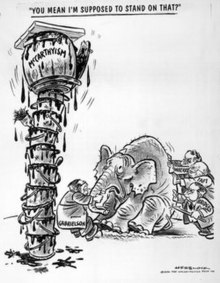Joseph Raymond McCarthy (November 14, 1908 – May 2, 1957) was an American politician who served as a Republican U.S. Senator from the state of Wisconsin from 1947 until his death in 1957. Beginning in 1950, McCarthy became the most visible public face of a period in the United States in which Cold War tensions fueled fears of widespread communist subversion.[1] He is known for alleging that numerous communists and Soviet spies and sympathizers had infiltrated the United States federal government, universities, film industry,[2][3] and elsewhere. Ultimately, the smear tactics that he used led him to be censured by the U.S. Senate. The term "McCarthyism", coined in 1950 in reference to McCarthy's practices, was soon applied to similar anti-communist activities. Today, the term is used more broadly to mean demagogic, reckless, and unsubstantiated accusations, as well as public attacks on the character or patriotism of political opponents.[4][5]
https://en.wikipedia.org/wiki/Joseph_McCarthy


沒有留言:
張貼留言